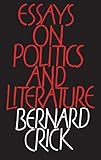Essays on Politics and Literature / Bernard Crick.
Material type: TextPublisher: Edinburgh : Edinburgh University Press, [2022]Copyright date: ©1990Description: 1 online resource (238 p.)Content type:
TextPublisher: Edinburgh : Edinburgh University Press, [2022]Copyright date: ©1990Description: 1 online resource (238 p.)Content type: - 9780748601059
- 9780748672615
- 820.9/358
- online - DeGruyter
| Item type | Current library | Call number | URL | Status | Notes | Barcode | |
|---|---|---|---|---|---|---|---|
 eBook
eBook
|
Biblioteca "Angelicum" Pont. Univ. S.Tommaso d'Aquino Nuvola online | online - DeGruyter (Browse shelf(Opens below)) | Online access | Not for loan (Accesso limitato) | Accesso per gli utenti autorizzati / Access for authorized users | (dgr)9780748672615 |
Frontmatter -- Contents -- Preface -- Acknowledgements -- Foreword -- One Literature and Politics -- Two The Political in Britain’s Two National Theatres -- Three Young Writers of the Thirties -- Four Koestler’s Koestler -- Five Hannah Arendt: Hedgehog or Fox? -- Six Beatrice Webb as English Diarist -- Seven Words -- Eight My LSE -- Nine Reading The Observer as a complex text -- Ten On the Difficulties of Writing Biography in General and of Orwell’s in particular -- Eleven Reading Nineteen Eighty-Four As Satire -- Twelve Animal Farm For Schools -- Thirteen Orwell and English Socialism -- Fourteen On the Orwell Trail -- Fifteen Wedekind’s ‘Spring Awakening’ -- Sixteen Horvath’s ‘Tales From the Vienna Woods’ -- Seventeen Pinter’s ‘No Man’s Land’ -- Eighteen Polly By Gaslight -- Nineteen David Edgar Catches Peter Jenkins’ Ear at the Barbican -- Twenty Barrault at the Barbican -- Index
restricted access online access with authorization star
http://purl.org/coar/access_right/c_16ec
This lively collection of essays gives a non-technical, but profound analysis of the essential relationship between politics and literature. Bernard Crick shows how 'political theatre' is often both bad theatre and simplistic politics, but how good producers can bring out political messages in such seemingly 'unpolitical' dramas as Twelfth Night.The essays begin with general themes, including a vigorous critique of RSC and NT producers' views of the political, and a denial of the myth that the far left dominated 1930s writing. They then move on to an analysis of George Orwell and finally to celebrate specific occasions and events in modern British theatre.With his refreshing disrespect for over-ornate and overly scholastic Marxist and academic writers, Professor Crick's book will be of interest to all those concerned with the arts and the theatre, as well as political philosophers and English literature students.
Mode of access: Internet via World Wide Web.
In English.
Description based on online resource; title from PDF title page (publisher's Web site, viewed 29. Jun 2022)


